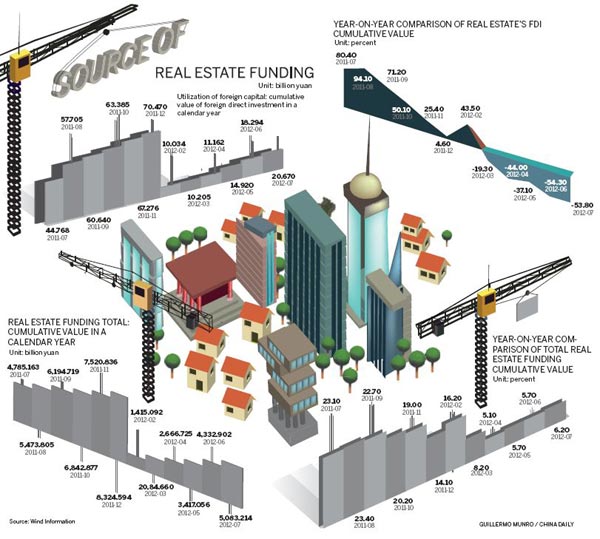Realty market attracting less foreign investment
 0 Comment(s)
0 Comment(s) Print
Print E-mail China Daily, August 30, 2012
E-mail China Daily, August 30, 2012
 |
While foreign investment in China's realty market has been shrinking, foreign investors are seeking other ways to invest in projects in the country, analysts said.
Investment in realty developments in China has seen a significant change since the beginning of the year. Of the 5.08 trillion yuan ($800 billion) invested in realty development in China between January and July, only 22.8 billion yuan of that was foreign funds, a 54.3 percent year-on-year decrease, according to the National Bureau of Statistics.
Average monthly foreign funds invested in realty development in the first seven months of the year totaled 3.26 billion yuan. In 2010, average monthly foreign funds in realty development totaled 6.63 billion yuan; the figure in 2011 was 6.78 billion yuan.
Foreign trusts and funds are quite cautious about decisions to invest in China's realty market, according to Xue Jianxiong, an analyst with China Real Estate Information Corp.
Refinancing is not as easy to get as it was several years ago, and the depreciation of the yuan in the short term may have affected foreign investors' enthusiasm to expand their business in China, Xue said.
As direct foreign investment in the realty market is not allowed, many foreign funds invest their yields from other businesses into realty development, Xue said.
Foreign investors are indeed selling some projects to collect cash, but they have various reasons to do so, said Tsui Yik, director of valuation and investment services with E-commercial China, a provider of commercial real estate services.
Some investors need to pull out of the market because their funds are due soon. Some Singaporean funds are obligated to sell their projects for this reason, Tsui said.
"Some foreign investors are selling not just because they are quitting China's market. Several foreign investors and developers have kept their projects for years for good returns, and they find the current time a good one, so they would like to secure their returns now," Tsui said.
Some foreign developers also offer discounts on their projects to collect cash in order to ease their tightening cash flows.
In fact, some overseas investors are searching for opportunities for investment, including some funds from Singapore and Europe, said Tsui.
Overseas funds, especially from Singapore, are injecting cash into the mainland's realty market. Perennial China Retail Trust has increased its stake in Chengdu Longemont Shopping Mall Development from 50 percent to 80 percent, to 2.24 billion yuan, in July.
Foreign funds are shifting their focus from less-developed cities to first-tier cities, and they are more interested in commercial developments such as office buildings and shopping malls than in the residential market, and some of them target industrial development such as warehouses and industrial parks, according to Tsui.
In Wuhan, capital of Hubei province, some funds from the United States and Singapore are also looking at investing in office buildings and commercial complexes, Tsui said.
In several cities including Shenyang, Chongqing and Xiamen, foreign investors are involved in block trading, Tsui said.
In commercial land development, there is currently no evidence that foreign funds are shrinking, said Zhang Ping, director of research for Cushman & Wakefield China.
In first-tier cities, foreign investors may have a wide range of choices; in some cities in central and western China, such as Wuhan and Chengdu, foreign investors may focus on retail properties with prestigious locations, said Zhang.
Possible adjustment of policies is another concern for foreign investors when they change their strategies of investment in the realty market, Tsui said.






Go to Forum >>0 Comment(s)